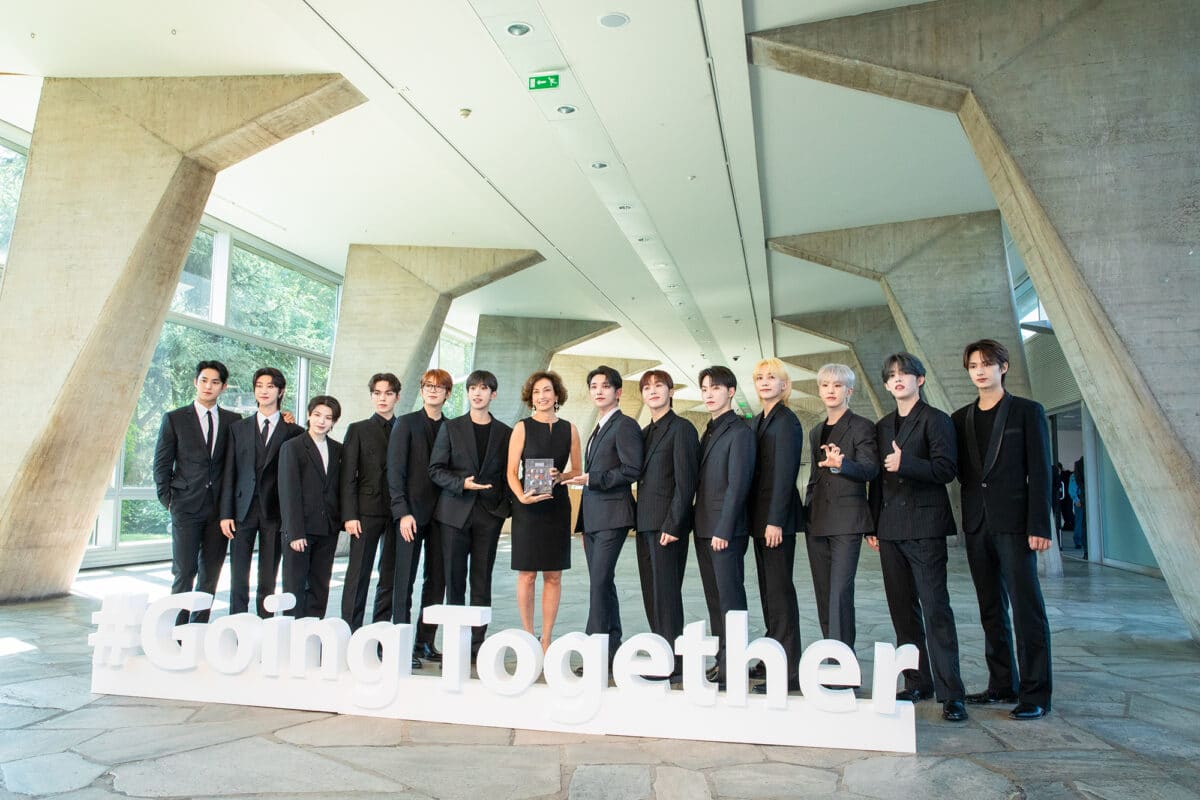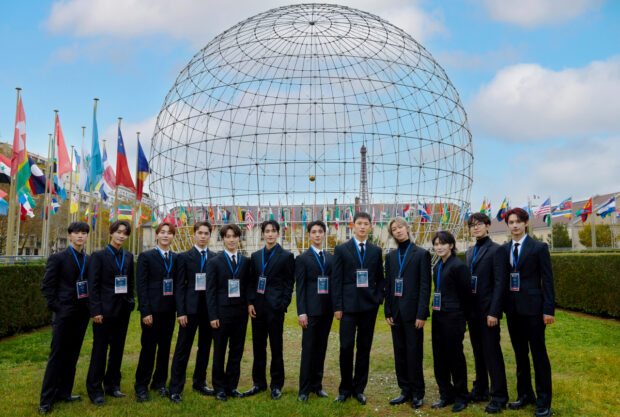
Seventeen with UNESCO Director-General Audrey Azoulay (center). Image: X/@UNESCO
In a digital age where the battle for hearts and minds is waged online, global organizations like the United Nations and UNESCO are turning to an unlikely but powerful ally — K-pop.
With its massive, dedicated fanbases and global reach, K-pop has emerged as more than just a music genre — it is a cultural phenomenon capable of driving social change. By partnering with groups like BTS and Seventeen, the UN and UNESCO are tapping into this energy, leveraging K-pop’s influence to amplify their messages on youth empowerment, mental health and global cooperation.
The latest example of this trend is UNESCO’s partnership with the K-pop sensation Seventeen in launching a new initiative called the “Global Youth Grant Scheme.” Announced on International Youth Day on Aug. 12, the program is designed to support young people worldwide by providing financial assistance, mentoring and opportunities to build their skills.
Seventeen, who became the first K-pop act to be appointed as UNESCO Youth Goodwill Ambassadors on June 26, kicked off the program by donating $1 million to jump-start its efforts. The group’s term as ambassadors ends after two years.
The partnership between UNESCO and Seventeen is part of a growing trend of international organizations working with K-pop stars to extend their reach, especially to younger generations.

K-pop group Seventeen poses for a picture at UNESCO headquarters in Paris, France, on Tuesday, Aug. 13, 2024. Image: Pledis Entertainment via The Korea Herald
Seventeen’s involvement with UNESCO is noteworthy because the UN organization focuses on using creativity to help young people build confidence and improve their mental health, themes that resonate deeply with the K-pop group’s fans. This was highlighted during the launch of the “Going Together – For Youth Creativity and Well-Being” program, where Seventeen members expressed their commitment to fostering a supportive environment for youth worldwide.
“Seventeen and UNESCO aim to support young people and their communities in achieving better lives. We hope to amplify the voice and creativity of youth worldwide,” Audrey Azoulay, director-general of UNESCO, said during Seventeen’s appointment ceremony at UNESCO headquarters in Paris in June.
A similar strategy was seen in the United Nations’ collaboration with K-pop phenomenon BTS, dating back to September 2018.
BTS delivered a speech at the UN General Assembly in New York as part of the “Youth 2030” initiative, where the group launched its “Love Myself” campaign with UNICEF. This campaign focused on self-love and antiviolence, resonating deeply with BTS’ global fan base, collectively known as Army.
“No matter who you are, where you’re from, your skin color, your gender identity, just speak for yourself. Find your name and find your voice by speaking yourself,” RM said in the group’s speech at the UN headquarters in New York on Sept. 25, 2018.
In partnering with groups like Seventeen and BTS, international organizations like the UN and UNESCO are not just looking to attract more attention to their programs — they are finding new ways to communicate important global issues in the digital world.
The collaboration with BTS, for instance, has been crucial in reaching younger demographics, a group that international organizations often struggle to engage with through traditional methods.
The power of K-pop fandoms such as Army and Seventeen’s Carat is a key reason these partnerships work so well.
These fan groups are far from casual fans; they are highly engaged and often advocate for social causes. Army has been known to mobilize quickly in support of various charitable initiatives, often inspired by the group’s messages. Similarly, Carat is expected to play a significant role in amplifying UNESCO’s message and gathering support for its programs.
And K-pop’s influence extends beyond music. It breaks through language and cultural barriers, making the genre a tailor-made partner for international organizations. Seventeen’s “Going Together” program matches UNESCO’s mission to promote peace, security and international cooperation.
“They are among the most influential artists in the world. This demonstrates how K-pop stars have secured a significant place in the mainstream pop market and wield considerable influence,” a local entertainment company official said Tuesday. “It seems that international organizations have recognized the synergy created when partnering with K-pop stars, rather than acting alone, in various activities,” the official added, citing BTS’ “Love Yourself” campaign and Seventeen’s positive and optimistic music as examples.
Music critic Lim Hee-yoon noted that K-pop artists tend to have relatively positive images compared to top artists in other genres, and they generally face fewer risks related to personal controversies or politically incorrect actions.
BTS’ partnership with the UN also highlights how cultural relevance can be a powerful tool in global diplomacy.
When the K-pop juggernaut returned to the UN General Assembly for the third time in 2021, they addressed the ongoing COVID-19 pandemic and the importance of youth in overcoming global challenges.
“If we believe in possibilities and hope, even when unexpected things happen, we will not lose our way, but discover new paths,” RM said at another address to the UN General Assembly in New York in September 2021.

